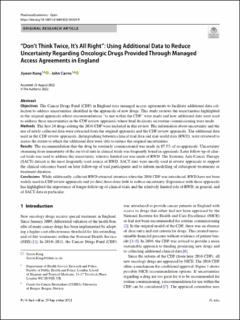| dc.contributor.author | Kang, Ji Yeon | |
| dc.contributor.author | Cairns, John Alexander | |
| dc.date.accessioned | 2022-12-12T08:54:50Z | |
| dc.date.available | 2022-12-12T08:54:50Z | |
| dc.date.created | 2022-11-15T13:11:13Z | |
| dc.date.issued | 2022 | |
| dc.identifier.issn | 2509-4262 | |
| dc.identifier.uri | https://hdl.handle.net/11250/3037138 | |
| dc.description.abstract | Objectives
The Cancer Drugs Fund (CDF) in England uses managed access agreements to facilitate additional data collection to address uncertainties identified in the appraisals of new drugs. This study reviews the uncertainties highlighted in the original appraisals where recommendations “to use within the CDF” were made and how additional data were used to address these uncertainties in the CDF review appraisals where final decisions on routine commissioning were made.
Methods
The first 24 drugs exiting the 2016 CDF were included in this review. The information about uncertainty and the use of newly collected data were extracted from the original appraisals and the CDF review appraisals. The additional data used in the CDF review appraisals, distinguishing between clinical trial data and real-world data (RWD), were reviewed to assess the extent to which the additional data were able to reduce the original uncertainties.
Results
The recommendation that the drug be routinely commissioned was made in 87.5% of re-appraisals. Uncertainty stemming from immaturity of the survival data in clinical trials was frequently found in appraisals. Later follow-up of clinical trials was used to address this uncertainty, whereas limited use was made of RWD. The Systemic Anti-Cancer Therapy (SACT) dataset is the most frequently used source of RWD. SACT data were mostly used in review appraisals to support the clinical outcomes based on later follow-up of trial participants and to inform modelling of subsequent treatments or treatment duration.
Conclusions
While additionally collected RWD attracted attention when the 2016 CDF was introduced, RWD have not been widely used in CDF review appraisals and (to date) have done little to reduce uncertainty. Experience with these appraisals has highlighted the importance of longer follow-up of clinical trials and the relatively limited role of RWD, in general, and of SACT data in particular. | en_US |
| dc.language.iso | eng | en_US |
| dc.publisher | Springer | en_US |
| dc.rights | Navngivelse 4.0 Internasjonal | * |
| dc.rights.uri | http://creativecommons.org/licenses/by/4.0/deed.no | * |
| dc.title | “Don’t Think Twice, It’s All Right”: Using Additional Data to Reduce Uncertainty Regarding Oncologic Drugs Provided Through Managed Access Agreements in England | en_US |
| dc.type | Journal article | en_US |
| dc.type | Peer reviewed | en_US |
| dc.description.version | publishedVersion | en_US |
| dc.rights.holder | Copyright 2022 The Author(s) | en_US |
| cristin.ispublished | true | |
| cristin.fulltext | original | |
| cristin.qualitycode | 1 | |
| dc.identifier.doi | 10.1007/s41669-022-00369-9 | |
| dc.identifier.cristin | 2074210 | |
| dc.source.journal | PharmacoEconomics - Open | en_US |
| dc.identifier.citation | PharmacoEconomics - Open. 2022. | en_US |

